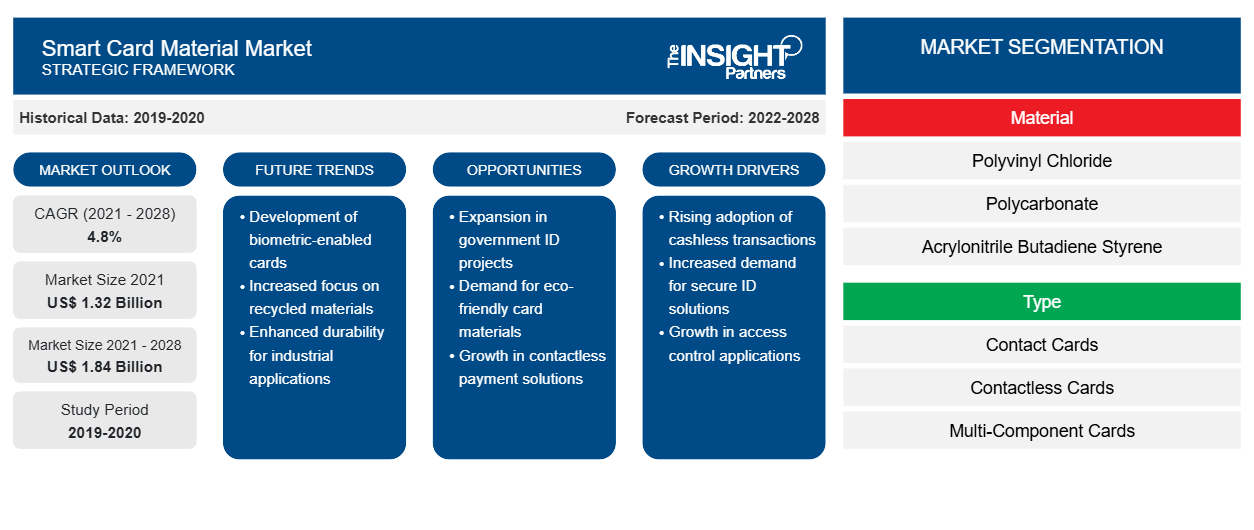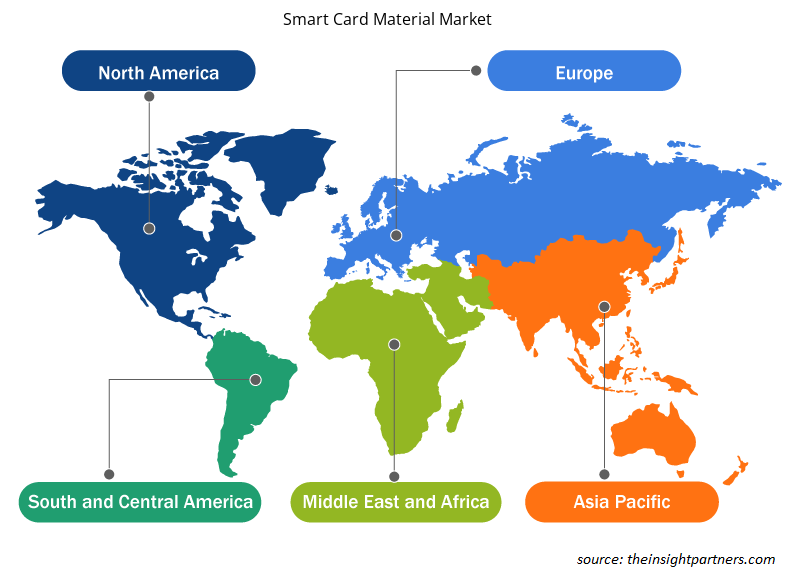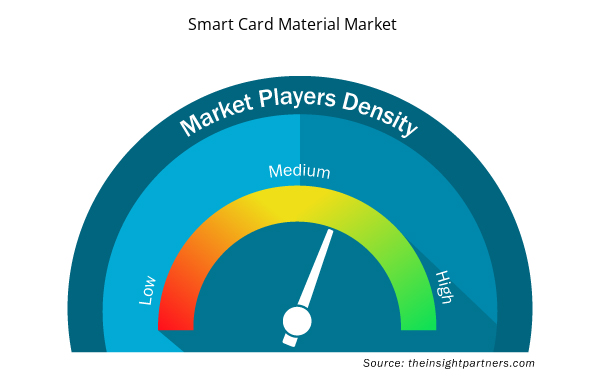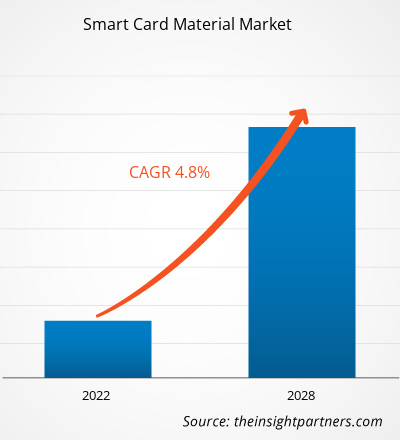The smart card material market is projected to reach US$ 1,837.78 million by 2028 from US$ 1324.57 million in 2021; it is expected to grow at a CAGR of 4.8% from 2021 to 2028.
A smart card, a type of chip card, is a plastic card that contains an embedded computer chip either a memory or microprocessor type which stores and transacts data. This data is usually associated with either value or information, or both, which is stored and processed within the chip. Smart card materials refer to chemical materials that are utilized in the manufacturing of these cards. These materials support the embedding and printing of information over them.
In 2020, Asia Pacific held the largest share of the global smart card material market. The demand for smart card materials in this region is increasing due to the growing use of smart cards in the telecommunications sector. Additionally, the rising globalization trend; and the proliferating banking, financial services, and insurance (BFSI) industry are key factors favoring the smart card material market growth in the region.
Customize This Report To Suit Your Requirement
You will get customization on any report - free of charge - including parts of this report, or country-level analysis, Excel Data pack, as well as avail great offers and discounts for start-ups & universities
Smart Card Material Market: Strategic Insights

- Get Top Key Market Trends of this report.This FREE sample will include data analysis, ranging from market trends to estimates and forecasts.
Customize This Report To Suit Your Requirement
You will get customization on any report - free of charge - including parts of this report, or country-level analysis, Excel Data pack, as well as avail great offers and discounts for start-ups & universities
Smart Card Material Market: Strategic Insights

- Get Top Key Market Trends of this report.This FREE sample will include data analysis, ranging from market trends to estimates and forecasts.
Impact of COVID-19 Pandemic on Smart Card Material Market
The ongoing COVID-19 pandemic has drastically altered the status of the chemical and materials sector and impacted the growth of the smart card materials market.The significant decline in the performances of several industrial sectors has impacted the demand for smart card materials. The impact of the pandemic varies across the different application segments. A surge in the data traffic and voice services has benefitted many telecom players, including broadband and mobile data center operators. However, the lockdown measures imposed by governments disturbed the supply chains of raw materials such as PVS, ABS, and PETG required for smart card manufacturing. The disease spread has adversely affected the operations in the government and BFSI sectors. However, as the economies are planning to revive their operations, the demand for smart card materials is expected to rise globally in the coming years.
Market Insights
Significant Growth in Telecommunications and Healthcare Sectors
Smart cards are extensively used in the telecommunications sector. The most prominent use of smart cards in this sector is in the form of subscriber identity module (SIM) cards or universal integrated circuit cards (UICC). These smart cards are manufactured mostly from polyvinyl chloride (PVC) and acrylonitrile butadiene styrene (ABS) materials. The smart card technology used in applications in this sector has undergone continuous advancements in the last several years, which has boosted the consumption of these cards. Further, healthcare organizations across the world are implementing smart health cards with a wide range of features and applications.
Smart Card Material Market Regional Insights
Smart Card Material Market Regional Insights
The regional trends and factors influencing the Smart Card Material Market throughout the forecast period have been thoroughly explained by the analysts at Insight Partners. This section also discusses Smart Card Material Market segments and geography across North America, Europe, Asia Pacific, Middle East and Africa, and South and Central America.

- Get the Regional Specific Data for Smart Card Material Market
Smart Card Material Market Report Scope
| Report Attribute | Details |
|---|---|
| Market size in 2021 | US$ 1.32 Billion |
| Market Size by 2028 | US$ 1.84 Billion |
| Global CAGR (2021 - 2028) | 4.8% |
| Historical Data | 2019-2020 |
| Forecast period | 2022-2028 |
| Segments Covered |
By Material
|
| Regions and Countries Covered | North America
|
| Market leaders and key company profiles |
Smart Card Material Market Players Density: Understanding Its Impact on Business Dynamics
The Smart Card Material Market market is growing rapidly, driven by increasing end-user demand due to factors such as evolving consumer preferences, technological advancements, and greater awareness of the product's benefits. As demand rises, businesses are expanding their offerings, innovating to meet consumer needs, and capitalizing on emerging trends, which further fuels market growth.
Market players density refers to the distribution of firms or companies operating within a particular market or industry. It indicates how many competitors (market players) are present in a given market space relative to its size or total market value.
Major Companies operating in the Smart Card Material Market are:
- Eastman Chemical Company
- PetroChina Company Limited
- Solvay S.A.
- KEM ONE
- SABIC
Disclaimer: The companies listed above are not ranked in any particular order.

- Get the Smart Card Material Market top key players overview
Application Insights
Based on application, the smart card material market is segmented into BFSI, government, telecommunication, retail, healthcare, hospitality, and others. The telecommunications segment held the largest share of the smart card material marketin 2020. Smart card is used as prepaid (stored value memory cards) telephone cards and microprocessor smart card-based SIM cards or UICC in mobile phones. The most selling smart card products in this sector are SIM and UICC, in terms of volume and value.
A few of the players operating in the global smart card material market include Eastman Chemical Company, PetroChina Company Limited, Solvay S.A., KEM ONE, SABIC, 3A Composites GmbH, Teijin Limited, LG Chem, BASF SE, and Westlake Chemical Corporation.
Report Spotlights
- Progressive industry trends in the smart card material market to help players develop effective long-term strategies
- Business growth strategies adopted by companies operating in developed and developing markets
- Quantitative analysis of the smart card material market from 2019 to 2028
- Estimation of global demand for smart card materials
- Porter’s Five Forces analysis to illustrate the efficacy of buyers and suppliers operating in the industry
- Recent developments to understand the competitive market scenario
- Market trends and outlook as well as factors driving and restraining the growth of the smart card material market
- Assistance in decision-making process by highlighting market strategies that underpin commercial interest, leading to the smart card material marketgrowth
- The size of the smart card material market size at various nodes
- Detailed overview and segmentation of the market, as well as the smart card material industry dynamics
- Size of the smart card material market in various regions with promising growth opportunities
Smart Card Material Market
By Material
- Polyvinyl Chloride (PVC)
- Polycarbonate (PC)
- Acrylonitrile Butadiene Styrene (ABS)
- Polyethylene Terephthalate-Glycol (PETG)
- Others
By Type
- Contact Cards
- Contactless Cards
- Multi-Component Cards
By Application
- BFSI
- Government
- Telecommunication
- Retail
- Healthcare
- Hospitality
- Others
Company Profiles
- Eastman Chemical Company
- PetroChina Company Limited
- Solvay S.A.
- KEM ONE
- SABIC
- 3A Composites GmbH
- Teijin Limited
- LG Chem
- BASF SE
- Westlake Chemical Corporation
- Historical Analysis (2 Years), Base Year, Forecast (7 Years) with CAGR
- PEST and SWOT Analysis
- Market Size Value / Volume - Global, Regional, Country
- Industry and Competitive Landscape
- Excel Dataset



Report Coverage
Revenue forecast, Company Analysis, Industry landscape, Growth factors, and Trends

Segment Covered
Material, Type, and Application

Regional Scope
North America, Europe, Asia Pacific, Middle East & Africa, South & Central America

Country Scope
Argentina, Australia, Brazil, Canada, China, France, Germany, India, Italy, Japan, Mexico, Russian Federation, Saudi Arabia, South Africa, South Korea, United Arab Emirates, United Kingdom, United States
Frequently Asked Questions
The contactless cards segment is the fastest growing segment in the global smart card material market during the forecasted period. Contactless cards are the smart cards with contactless credentials and have a size like credit cards or debit cards. The market for the contactless cards segment is growing due to its various benefits.
The telecommunication segment held the largest share of the market in 2021. In the telecommunication industry, smart cards are used in two primary applications. Firstly, it is used as prepaid (stored value memory cards) telephone cards and as the microprocessor smart card-based subscriber identity module (SIM) or universal integrated circuit card (UICC) in mobile phones.
The contact cards segment held the largest share of the market in 2021. Contact cards are the smart cards that have a size like conventional debit and credit card. Contact smart card contains a single, embedded, and integrated circuit chip that consists of either memory or memory plus microprocessor.
The polyvinyl chloride segment held the largest share of the global smart card material market in 2021. Polyvinyl chloride is the most common and strong plastic material used for card manufacturing. The material is used for contact and contactless cards.
The major players operating in the global smart card material market are Eastman Chemical Company; PetroChina Company Limited; Solvay S.A.; KEM ONE; SABIC; 3A Composites GmbH; Teijin Limited; LG Chem; BASF SE; and Westlake Chemical Corporation; among others.
In 2021, Asia Pacific held the largest share of the global smart card material market. The major factor driving the smart card materials market in the Asia Pacific region is the increasing use of smart cards in various applications such as government, transportation, retail, and education sectors.
Trends and growth analysis reports related to Chemicals and Materials : READ MORE..
The List of Companies - Smart Card Materials Market
- Eastman Chemical Company
- PetroChina Company Limited
- Solvay S.A.
- KEM ONE
- SABIC
- 3A Composites GmbH
- Teijin Limited
- LG Chem
- BASF SE
- Westlake Chemical Corporation

 Get Free Sample For
Get Free Sample For